Global crisis poses defence dilemma for John Swinney
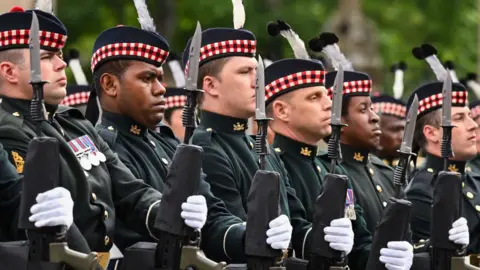 Getty Images
Getty ImagesIn the aftermath of the recent US strikes on Iran, Holyrood politicians wanted to know if Scottish facilities such as the government-owned Prestwick Airport were excluded from use in such attacks.
The Scottish government's External Affairs Secretary Angus Robertson assured MSPs that Prestwick had not played any part in this particular operation.
He also pointed out that the airport is regularly used by the air forces of the UK's allies such as the US and Canada - an important revenue stream for Prestwick.
That doesn't quite answer the question, but it does help clarify the careful balance the Scottish government is trying to find amid wars in the Middle East and Ukraine and President Donald Trump's uncertain position on the defence of Europe.
The Holyrood administration seems keen to avoid undermining the UK's positions on defence and foreign affairs at such a sensitive time of international conflict.
First Minister John Swinney echoed the prime minister's call for "de-escalation" in Iran following the US strikes while warning of the potential dangers of the military intervention.
He did not openly condemn President Trump for taking the decision to bomb Iran's nuclear facilities.
SNP ministers want to be seen as reliable partners to the UK's allies in Nato in the event that one day they might be seeking independent Scottish membership of that alliance.
At the same time, they are sensitive to opinion in their own party, and beyond, that favours a diplomatic rather than a military approach to conflict resolution.
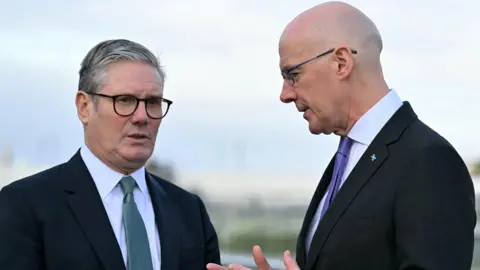 Getty Images
Getty ImagesThe SNP's Westminster leader Stephen Flynn tends to be less nuanced in his contributions, at one point comparing the current situation with the build up to the Iraq war.
It certainly seems fair to observe a difference in the tone of comments from Scottish ministers and some other SNP politicians.
To be clear, international relations are under UK government control. The Scottish government does not have a formal role in decision-making but can express its views and potentially lobby UK ministers.
Nuclear weapons
In Scotland, the most obvious policy clash is over nuclear weapons.
The UK government is committed to maintaining the Trident nuclear weapons system and the four Clyde-based submarines designed to deploy nuclear armed missiles.
UK ministers believe this is essential to deter Russia and other states with nuclear weapons from pointing them in our direction.
The SNP is fundamentally opposed to the possession of nuclear weapons, which they believe could encourage proliferation.
As the party's 2024 election manifesto makes clear, the SNP "has never and will never support retention or renewal of Trident".
Prime Minister Sir Keir Starmer recently described this policy as "wrong-headed".
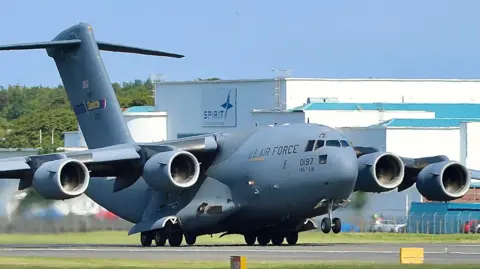 Eddie Wallace
Eddie WallaceMore generally, the SNP's opponents consider their anti-nuclear stance to be in direct conflict with their support for Scottish membership of Nato in the event of independence.
Nato is a 32-country military alliance underpinned by the potential use of nuclear weapons.
The SNP point out that most Nato countries do not have nuclear weapons and that Finland has just joined as a non-nuclear member.
Finland is not, however, seeking the removal of nuclear weapons from its territory.
Defence spending
Both the UK and Scottish governments agree that there is a need to increase UK defence spending as a share of national economic output or GDP.
The prime minister is not only seeking to present this as a commitment to protecting UK interests but as an economic opportunity that could bring good jobs to all corners of the UK.
The idea of a defence dividend was underlined by his decision to launch the UK's strategic defence review at the BAE Systems naval shipyard in Glasgow.
That suggested a longer term commitment to Scottish shipbuilding. There was also the hint that proposals for a UK-wide network of munitions factories could include new or expanded facilities in Scotland.
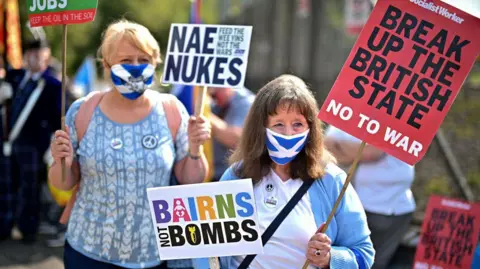 Getty Images
Getty ImagesThe Scottish government has not objected to increased UK defence spending north of the border, although the first minister made clear to me in a recent interview that he favours the cash being used for conventional rather than nuclear defence.
Labour has used this extra spending to raise questions about how the Scottish government deploys its economic and skills development resources to support the defence sector.
The UK defence secretary, John Healey, accused SNP ministers of "student union politics" when it emerged that a specialist welding centre planned by Rolls Royce for Glasgow could be under threat because it was being denied a £2.5m grant from the economic development agency Scottish Enterprise.
The Scottish government said the facility to support the construction and maintenance of submarines was not eligible for funding because of a longstanding policy of not allowing public money to support the manufacture of munitions.
In a Holyrood debate, the Conservatives urged the SNP to change this stance - which seemed to draw sympathy from the SNP's former defence spokesman Stewart McDonald.
Writing on social media, he said that "it pains me to see we are not evolving with the serious times we live in".
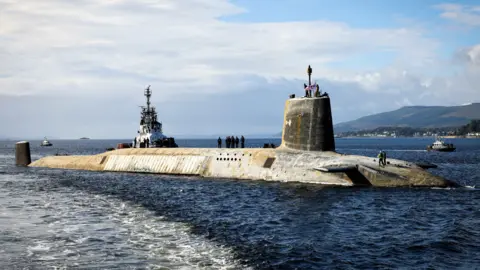 Getty Images
Getty ImagesDeputy First Minister Kate Forbes defended the policy and pointed to other financial support the Scottish government had given to defence firms for diversification and training.
In a BBC interview, she also described the ban on backing munitions production as the "current position", which seemed to hint at the potential for adjustment.
There is supposed to be an update on a review of the human rights criteria to be applied when considering applications for devolved public support before Holyrood breaks for the summer.
There are certainly those who want the Scottish government to do more to help grow the defence industries based in Scotland that support jobs.
Economic growth is after all supposed to be one of the Scottish government's four priorities.
There are also those such as the Scottish Greens who want them to do less. They believe it is morally wrong to subsidise bomb making and the firms that carry out the work.
The SNP’s manifesto called for a ban on arms sales to Israel. In power, Labour has suspended some arms export licences.
The SNP supports the recognition of a Palestinian state, which Labour has said it would do as part of a renewed peace process with Israel towards a two state solution.
The former first minister, Humza Yousaf, criticised the UK's decision to use anti-terror laws to proscribe a pro-Palestinian group for vandalising RAF planes. He said this was a ludicrous over-reaction.
 PA Media
PA MediaThere has been a further row about a donation of NHS equipment from the Scottish government to Ukraine.
This was given on a humanitarian basis which under rules that are followed by the UK and other countries prevents its use in a military context.
Some have argued that this gift should have been made in a different way so that it could have gone to the frontline if required.
These issues do not just draw dividing lines between the SNP and its rivals to the left and right of the political spectrum in the run up to the Holyrood election in 2026.
Defence and foreign policy is also a sensitive political issue within the Labour movement.
The prime minister's commitment to boost spending is welcomed by defence unions who see improved prospects for their members.
Warfare v welfare
There are those on the Labour left like the former Scottish party leader Richard Leonard who have publicly expressed concern that the UK government is prioritising weapons over welfare.
The initial increase in defence spending is principally being funded by a raid on the overseas aid budget.
Sustained increases might squeeze the cash available for public services which would inevitably cause significant rows within the Labour party never mind with its rivals including the SNP.
A Labour rebellion is already underway at Westminster over the government's attempts to slow the growth in welfare spending by cutting some benefits.
It is not of course possible to spend the same money twice and choices must be made.
As UK defence spending rises, so do the tensions within Scottish politics over how best to use public resources to meet the challenges of an unstable world.
